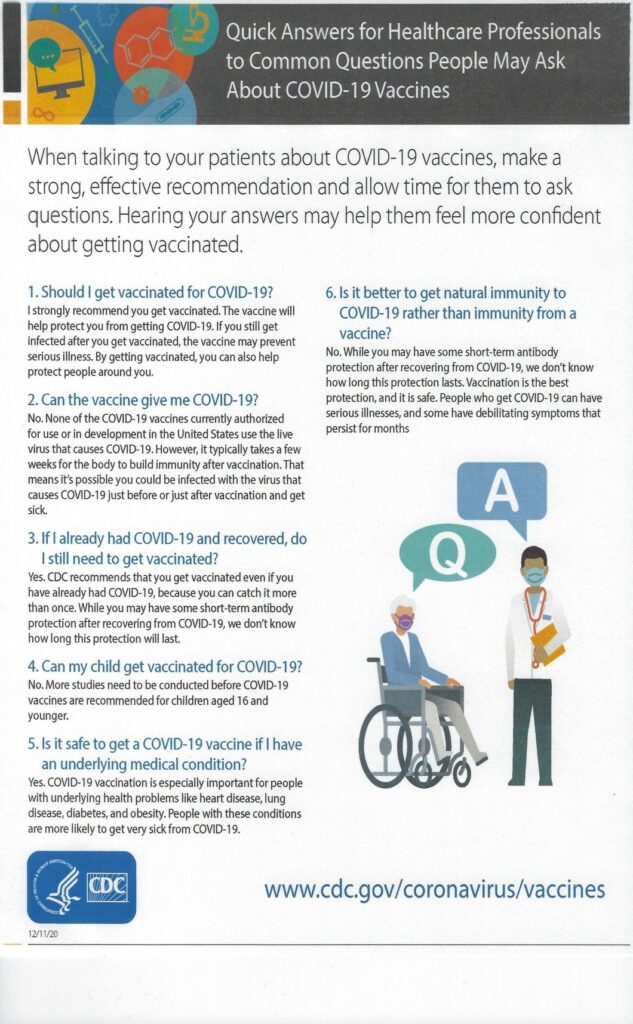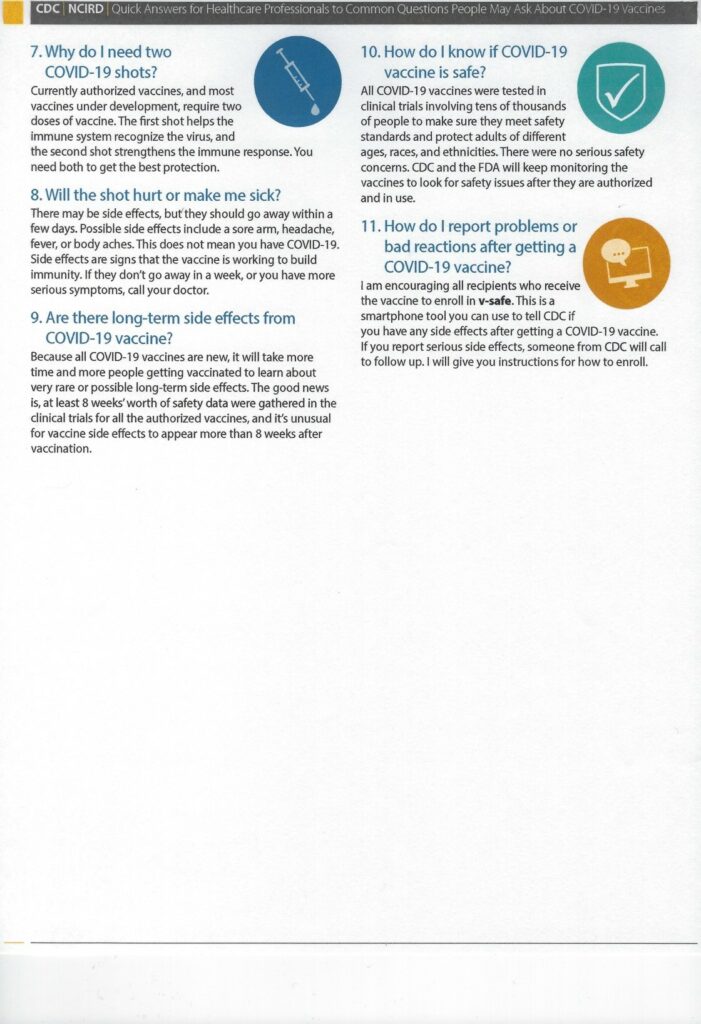Health Tips
HEALTHY TIPS, FOR BETTER BODIES,
FOR BETTER CHRISTIANS
COVID-19
WHAT YOU NEED TO KNOW
What is Covid-19?
Coronavirus Disease 2019 (Covid-19) is a respiratory virus that was first identified in December 2019 in Wuhan, Hubel Province, China. This virus probably originally emerged from an animal source but is now spreading from person-to-person.
How is it Transmitted?
- Close personal contact, such as touching and shaking hands
- Droplets while coughing and sneezing.
- Touching your eyes, nose, and mouth with unwashed hands.
How is it diagnosed?
Health care providers will assess patients and consult with the Health Department on whether testing is indicated.
What is treatment?
Most people will recover on their own. There are no specific treatments for Covid-19.
How do I prevent the spread of Covid-19?
- Wash your hands with soap and water often for at least 20 seconds.
- Avoid touching eyes, nose, and mouth with unwashed hands.
- Avoid close contact with people who are sick.
- Cover your cough or sneeze with tissue, then throw the tissue in the trash.
- Stay home if you are sick.
- Clean and disinfect frequently touched objects and surfaces.
What are the Symptoms?
Current symptoms reported have included mild to severe respiratory illness with fever, cough and difficulty breathing.
Home Care Instructions for
People with Respiratory Symptoms
During the current Coronavirus Disease-2019 (COVID-19) outbreak it is likely that many people with cold and flu-like symptoms have COVID-19. Most people do not need to see a doctor or get a test for COVID-19 because they will have a mild illness and get better at home. However, people should call their doctor early if they are 65 years and older, pregnant, or have a health problem such as a chronic disease or a weak immune system, because they are at higher risk of serious illness.This guidance provides home care instructions for people with symptoms of COVID-19 which include fever, cough, shortness of breath or trouble breathing. Symptoms may also include chills, body aches, sore throat, headache, diarrhea, nausea/vomiting, and runny nose.
Home Care
There is no specific treatment for the virus that causes COVID-19. Here are steps that you can take to help you get better: • Rest • Drink plenty of fluids • Take acetaminophen (Tylenol®) to reduce fever and pain. • Note that children younger than age 2 should not be given any over-the-counter cold medications without first speaking with a doctor. • Note that these medicines do not “cure” the illness and do not stop you from spreading germs.
Seeking Medical Care
Seek prompt medical care if your symptoms get worse (e.g. difficulty breathing). Call your doctor early if you are at higher risk of serious illness. If you need assistance finding a medical provider or mental health services, please call 2-1-1.
Call ahead before visiting your doctor:
You may be able to get advice by phone, including discussing with your doctor if you need to be examined or tested. If you do visit a healthcare facility, put on a mask before you enter to protect others from catching an infection from you.It is recommended that you seek medical care for serious symptoms, such as: 1. Difficulty breathing, 2. Can’t keep fluids down, 3. Dehydration, 4. Confusion, 5. Other serious symptoms.People with life-threatening symptoms, should call 911. Tell the dispatch personnel that you may have COVID-19. If possible, put on a facemask before emergency medical services arrive.
COVID-19 may be stressful for people, visit publichealth.lacounty.gov/media/Coronavirus/ to learn how care for your mental health and support your loved ones. If you need to speak with someone about your mental health, contact your doctor or the Los Angeles County Department of Mental Health Access Center 24/7 Helpline at (800) 854-7771.
publichealth.lacounty.gov/media/Coronavirus
PROTECTING OTHERS
Follow the steps below to help prevent the disease from spreading to people in your home and your community.
Stay home, except to get medical care
Do not go to work, school, or public areas. • Stay home until at least 7 days have passed after your symptoms first appeared AND at least 3 days after you have recovered, whichever is longer. Recovery means that your fever is gone for 72 hours without the use of fever-reducing medications and your respiratory symptoms (e.g. cough, shortness of breath) have improved. • If you must leave home while you are sick, do not use public transportation. Use a personal vehicle if possible. If you cannot drive yourself, keep as much distance as possible between you and the driver, leave the windows down and wear a mask if possible. • If you do not have someone to help you, if possible, arrange for food and other necessities to be left at your door. If you need to meet someone at your door, wear a mask.
Separate yourself from other people in your home
Stay in a specific room and away from other people in your home as much as possible. It is particularly important to stay away from people who are at higher risk of serious illness. Consider alternate living arrangements for them if at all possible. • Use a separate bathroom. It this is not possible, clean the bathroom after use (see below). • Try to stay at least 6 feet from others. • Open windows or use a fan or an air conditioner, if possible, in shared spaces in the home to ensure good air flow. • Do not allow visitors and limit the number of people in your home. • Do not handle pets or other animals while you are sick.
Wear a facemask when you are around others
You should wear a facemask when you are around other people (e.g., sharing a room or vehicle) or pets and before you enter a hospital or doctor’s office. If you are not able to wear a facemask (for example, because it causes trouble breathing), then people who live with you should not be in the same room with you. If they must enter your room, they should wear a facemask. After leaving your room, they should immediately clean their hands, then remove and dispose of their facemask, and clean their hands again wash their hands.
Cover your coughs and sneezes
Cover your mouth and nose with a tissue when you cough or sneeze. Throw used tissues in a lined trash can; immediately wash your hands.
Avoid sharing personal household items
Do not share dishes, drinking glasses, cups, eating utensils, towels, or bedding with other people or pets in your home. Wash them thoroughly with soap and water after use.
Clean your hands often
Wash your hands often and thoroughly, especially after blowing your nose, coughing, or sneezing; going to the bathroom; and before eating or preparing food. Use soap and water for at least 20 seconds. If soap and water are not available, clean your hands with a hand sanitizer that contains at least 60% alcohol, covering all surfaces of your hands and rubbing them together until they feel dry. Use soap and water if your hands are visibly dirty.
Clean and disinfect all “high-touch” surfaces every day
High touch surfaces include counters, tabletops, doorknobs, bathroom fixtures, toilets, phones, keyboards, tablets, and bedside tables. Also, clean and disinfect any surfaces that may have body fluids on them. Use household cleaning and disinfectant sprays or wipes, according to the product label instructions. See cleaning instructions in Preventing the spread of respiratory illness in the home on the Public Health website
TALK TO YOUR CLOSE CONTACTS
Quarantine
People in your house, your intimate partners, and caregivers as well as people who were within 6 feet of you for more than 10 minutes while you had symptoms, are considered to be “close contacts”. Because these close contacts have been exposed, it is possible that they will get COVID-19. They should self-quarantine even if they feel well because it can take 2– 14 days for them to show symptoms. See the Home quarantine guidance for those exposed to COVID-19.
Cleaning
Your caregivers and household contacts should wear a disposable facemask and gloves if they clean your room or bathroom or come into contact with your body fluids, and/or secretions (such as sweat, saliva, sputum, nasal mucus, vomit, urine, or diarrhea). They should remove and dispose of their gloves first, clean their hands, then remove and dispose of their facemask, and clean their hands again.
Los Angeles County Department of Public Health
Revised 3:19/2020


